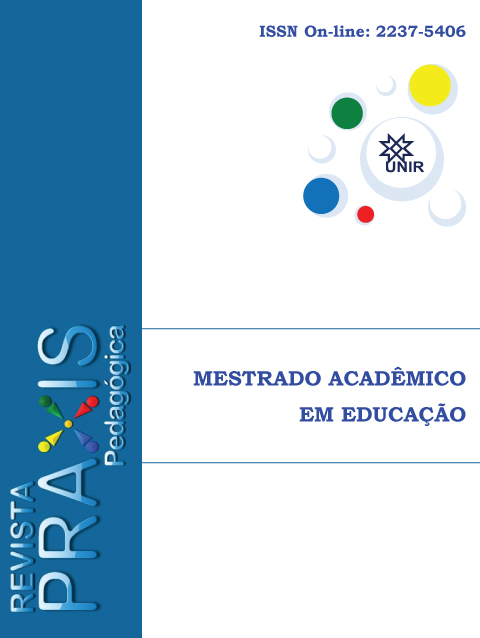DIALOGUES BETWEEN CRITICAL EDUCATION AND TECHNOLOGIES
DOI:
https://doi.org/10.69568/2237-5406.2019v2n2e3723Keywords:
critical education, technologies, teachersAbstract
The objective of this article is to critically analyze, from an open questionnaire answered by a group of teachers from a campus of Catarinense Federal Institute, which possible dialogues this group establishes between critical education and technologies in its pedagogical practice. Through this objective, some questions guide this research movement: 1- What do these teachers understand by critical education? 2- And, according to them, what examples of activities developed with the use of technology/ies in their classes, potentialize critical education among their students? The conclusions of the research point out that theoretically it is possible to approach these two areas of knowledge – technologies and critical education. In the answers to the questionnaire, the teachers show an approximation with the concepts of technologies and critical education, however, when making explicit examples of activities developed in the classroom, they most reveal little articulation between these two concepts. This little connection between technologies and critical education in practical activities occurs, in my point of view, due to a certain lack of initial and/or continuous professional developments aimed at teaching and learning with technologies. Proposals for teacher’s development that discuss, from a theoretical- practical perspective, technologies as potentiating for critical education, can be key elements for more productive dialogues between these two areas of knowledge.
References
BETTEGA, M. H. A educação continuada na era digital. São Paulo: Cortez, 2010. BRITO, G.; PURIFICAÇÃO, I. Educação e novas tecnologias: um repensar. Curitiba: IBPEX, 2006.
BUSTOS, A.; RÓMAN, M. La importancia de evaluar la incorporación y el uso de las tic en educación. En: Revista Iberoamericana de Evaluación Educativa, Madrid, v. 4, nº 2, p. 3-7, 2011.
COLL, C.; MONEREO, C. Psicologia da educação virtual: aprender e ensinar com as tecnologias da informação e comunicação. Porto Alegre: Artmed, 2010.
DELORS, J. Educação: um tesouro a descobrir. São Paulo: Cortez, 2003. FREIRE, P. Pedagogia do oprimido. Rio de Janeiro: Paz e Terra, 2001.
______. Pedagogia da autonomia – saberes necessários à prática educativa. São Paulo: Paz e Terra, 1996.
GIL, A. Métodos e técnicas de pesquisa social. São Paulo: Atlas, 1999. LÉVY, P. Cibercultura. Rio de Janeiro: Editora 34, 1999.
LION, C. (et al.). Las tecnologías y la enseñanza en la educación superior - el caso de USINA. En: Revista Iberoamericana de Evaluación Educativa, Madrid, v. 4, nº 2, p. 107-117, 2011.
MAGGIO, M.; LION, C. Las prácticas de la enseñanza recreadas en los escenarios de alta disposición tecnológica. Proyecto de Investigación (2013- 2016). Facultad de Filosofia y Letras, Universidad de Buenos Aires, 2012.
MEDEIROS, Z.; VENTURA, P. O conceito cultura tecnológica e um estudo no meio educacional. In: Ensaio - Pesquisa em Educação em Ciências, Belo Horizonte, v. 9, nº 2, p. 237-251, 2007.
MENEZES JORDÃO, C. Abordagem comunicativa, pedagogia crítica e letramento crítico – farinhas do mesmo saco? In: HILSDORF ROCHA, C. & FRANCO MACIEL, R. (org.) Língua estrangeira e formação cidadã: por entre discursos e práticas. Novas Perspectivas em Linguística Aplicada, vol. 33, Campinas: Pontes, 2013. p. 37-54.
PENNYCOOK, A. Language as local practice. New York: Routledge, 2010.
RICOEUR, P. O conflito das interpretações: ensaios de hermenêutica. Rio de Janeiro: Imago, 1978.
SARDINHA, A. Comunicação e as novas tecnologias no contexto de atuação política dos movimentos sociais contemporâneos: um estudo do portal ilga.org. In: Contemporânea, São Paulo, v. 9, nº 1, p. 46-59, 2011.
SERAFIM, M. L.; SOUSA, R. Multimídia na educação: o vídeo digital integrado ao contexto escolar. In: SOUSA, R.; MOITA, F. & CARVALHO, A. (org.). Tecnologias digitais na educação. Campina Grande: EDUEPB, 2011. p. 19-50.
TRIVIÑOS, A. Introdução à pesquisa em ciências sociais: a pesquisa qualitativa em educação. São Paulo: Atlas, 1997.
Downloads
Published
Issue
Section
License
Ao submeter um artigo à Revista Praxis Pedagógica e tê-lo aprovado, os autores concordam em ceder, sem remuneração, todos os direitos de primeira publicação e a permissão para que Praxis Pedagógica redistribua esse artigo e seus metadados aos serviços de indexação e referência que seus editores julguem apropriados.


